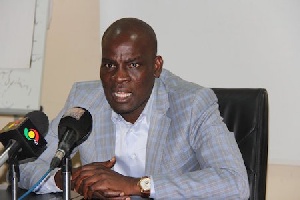Government could end up spending as much as GHC700million annually on skills development in the coming years to tackle youth employment, Employment Minister Haruna Iddrissu has indicated.
When realised, the amount will be about GHC652 million more than government has allocated to the entire 2016 budget of the Ministry of Employment and Labour Relations for its programmes, including funding this year’s skills development programme.
The ambitious spending on one of the pro-employment and underemployment policies could provide funding challenges for government to address skills mismatch challenges in the country.
Mr. Iddrissu is however upbeat plans to increase spending on skills development programme will be achieved, based on the economy’s performance, donor inflows, and Parliament’s generous appropriation-allocations.
He said: “We now have a legislation in place that says 80 percent of Communication Services Tax be dedicated to youth unemployment and 10 percent of GETFUND, as well as 5 percent of the District Common Funds will be allocated to support youth unemployment.
“So going into the future I can foresee a budget of GHC500 to GHC700million every other year dedicated for skills building and employment of young persons, and for me that is very encouraging. We only need to clear some of these outstanding arrears and liabilities that were inherited in the implementation of a noble initiative.”
The decision to ramp-up funding to government’s youth employment programme is expected to raise eyebrows among civil society organisation and corruption watchdog organisations: the main state-sponsored employment vehicle the defunct Ghana Youth Employment and Entrepreneurial Development Agency (GYEEDA) was embroiled in corruption allegations that involved a total of more than a billion cedis.
The allegations forced government to replace GYEEDA with the current Youth Employment Agency (YEA) – giving it the sole objective of job-creation and building the skills capacity of beneficiaries.
According to government’s 2016 budget statement presented to Parliament in November last year, a total of 47,000 youth were engaged under various modules of the YEA.
In terms of projecting unemployment in the country, Mr. Iddrisu stated: “It is quite worrying for young people, especially if you look at the category from JHS to SHS who are not able to climb the educational ladder. We need to cater by way of addressing skills mismatch and skills gap for that category.
“There is also the category of university and polytechnic graduates, which because the economy is not expanding enough and because of rationalised public policy decisions on compensations we are not able to absorb many of also creating another epoch of unemployment. We also have the situation where many graduates are not able to get employed because of the wrong and erroneous notion that the public sector remains the most viable employer in this country.
"We need to disabuse the minds of our people, get the private and the public sector to work together very closely. In my view the private sector should be the incubator of jobs and government should provide an enabling environment for them.”
He also disclosed that government is committed to a specific policy framework that supports the employment of young persons, which he says “remain a national and political imperative”.
“We should conceive it as a national security threat if we are unable to absorb many of our youth and also appreciate the dichotomy between skilled youth and unskilled. There is a category that still needs their skills to be enhanced, and I should trust that subsequent to the ministerial report we have captured many of these issues,” he added.
According to Mr. Iddrissu, youth employment initiatives started about a decade ago without any proper legislation, allocation, and lacked an accounting system -- which he thinks accounted for the leakages in the past.
“As laudable as the decision was in 2007, it was not backed by legislation; so many of the decisions were left at the behest of ministers working together with appointed coordinators. There was no defined structure. I can assure you today that I don’t take any decision in respect of Youth Employment Agency.”
The Tamale South MP also confirmed that government has begun a policy that will ensure 65 percent of service charges will be paid to the Youth Employment Module’s beneficiary allowance.
He explained that the levies accrue from the Communication Service tax, District Assembly Common Fund and the GETFUND.
“Like in the past, you could have a situation where a service provider got GHC500 from government in respect of a beneficiary but ended up - on the basis of its cost - returning less than GHC100 to the beneficiary. Now 65 percent of the dedicated amount of Youth Employment Agency funds accruing from Communication Service tax, District Assembly Common Fund and the GETFUND will be dedicated to the payment of beneficiary allowances on a dedicated payroll policy system,” he said.
By the new policy and arrangement, Mr. Iddrisu further stated, each beneficiary is expected to earn GHC250 as allowance with GHC50 going into a provident fund.
Business News of Thursday, 26 May 2016
Source: B&FT













